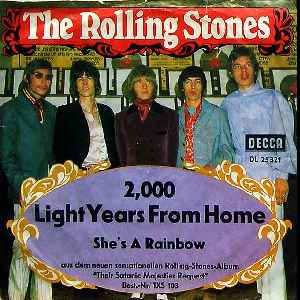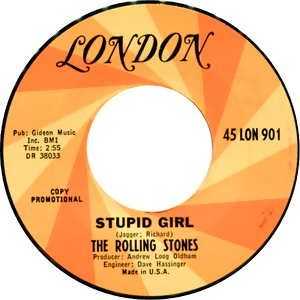
"Sympathy for the Devil" is a song by English rock band the Rolling Stones. Written by the songwriting partnership of Mick Jagger and Keith Richards, it is the opening track on the band's 1968 album Beggars Banquet. The song has received critical acclaim and features on Rolling Stone's 500 Greatest Songs of All Time list. It is the 22nd best ranked song on critics' all-time lists according to Acclaimed Music.

It's Only Rock 'n Roll is the 12th British and 14th American studio album by the English rock band the Rolling Stones, released on 18 October 1974 by Rolling Stones Records. It was the last Rolling Stones album to feature guitarist Mick Taylor; the songwriting and recording of the album's title track had a connection to Taylor's eventual replacement, Ronnie Wood. It's Only Rock 'n Roll combines the core blues and rock 'n' roll–oriented sound with elements of funk and reggae. It's Only Rock 'n Roll reached number one in the United States and number two in the UK.
“Sweet Black Angel” is a song by the Rolling Stones, included on their 1972 album Exile on Main St. It was also released on a single as the B-side to "Tumbling Dice" prior to the album. The song features a West Indian rhythm.

"She's a Rainbow" is a song by the Rolling Stones and was featured on their 1967 album Their Satanic Majesties Request. It has been called "the prettiest and most uncharacteristic song" that Mick Jagger and Keith Richards wrote for the Stones, although somewhat ambiguous in intention.
"Back Street Girl" is a song by the English rock band the Rolling Stones written by Mick Jagger and Keith Richards. It first appeared on the UK version of their 1967 album Between the Buttons but was not included on the US version. It was first released in the US on the 1967 album Flowers.

"Have You Seen Your Mother, Baby, Standing in the Shadow?" is a song by the English rock band the Rolling Stones. Written by Mick Jagger and Keith Richards, it was recorded in the late summer of 1966 during early sessions for what would become their Between the Buttons album. It was the first Stones single to be released simultaneously in both the UK and the US, and reached number five and number nine on those countries' charts, respectively.
"Sweet Virginia", a slow country-inspired song, was written by Mick Jagger and Keith Richards. It is the sixth track on the Rolling Stones' 1972 double album Exile On Main St..

"Star Star" is a song recorded by the English rock band the Rolling Stones. It was written by Mick Jagger and Keith Richards. The song was released as a single for the band's album Goats Head Soup (1973), with "Doo Doo Doo Doo Doo (Heartbreaker)" as its B-side. The song's title was changed to "Star Star" from "Starfucker" after Ahmet Ertegün of Atlantic Records insisted on the change.

"Dandelion" is a song by the English rock band the Rolling Stones, written by Mick Jagger and Keith Richards, and first released as a B-side to "We Love You" in August 1967. John Lennon and Paul McCartney sing backing vocals. Billboard described the single as "an easy beat rocker with good story line."

"Angie" is a song by the English rock band The Rolling Stones, featured on their 1973 album Goats Head Soup. It also served as the lead single on the album, released on 20 August 1973.
"Goin' Home" is a song recorded by the English rock band the Rolling Stones. Written by Mick Jagger and Keith Richards, it was the longest popular music song at the time, coming in at 11 minutes and 35 seconds, and was the first extended rock improvisation released by a major recording act. It was included as the sixth track on side one of the United Kingdom version and the fifth track on side two of the American version of the band's 1966 studio album Aftermath.

"2000 Light Years from Home" is a song by the English rock band the Rolling Stones, released on their 1967 album Their Satanic Majesties Request. Written by Mick Jagger and Keith Richards, it also appeared as the B-side to the American single "She's a Rainbow", and charted as a single in Germany.
"Think" is a Mick Jagger and Keith Richards composition that first appeared as a Chris Farlowe single which reached No 37 on the UK Singles Chart in January 1966.

"The Spider and the Fly" is a song by English rock band the Rolling Stones, recorded in May 1965 and first released on the US version of their 1965 album Out of Our Heads. In the UK, it was released as the B-side to "(I Can't Get No) Satisfaction". In 1971, the song was released on an album for the first time in the UK on the Decca Records compilation Stone Age.

"Stupid Girl" is a song recorded by the English rock band the Rolling Stones. Written by Mick Jagger and Keith Richards, the song featured on the band's 1966 album Aftermath. It was also issued as the B-side of the U.S. "Paint It Black" single.
"Something Happened to Me Yesterday" is the closing track of the Rolling Stones' 1967 album Between the Buttons.
"Loving Cup" is a song by the Rolling Stones, which appears on their 1972 album Exile on Main St.

"Take It or Leave It" is a song written by Mick Jagger and Keith Richards. It was initially given away by them to the Searchers, a band with declining chart success, in hopes of making them popular again. Pye Records released the single on 8 April 1966 and it peaked at number 31 on the Record Retailer chart in May of that year. Though it was more popular in mainland Europe, the single was their penultimate song to chart. It received mixed reviews in the British Press.
"I Am Waiting" is a song recorded by the English rock band the Rolling Stones. It was written by Mick Jagger and Keith Richards and released on the band's 1966 studio album Aftermath.
"The Lantern" is a song from the Rolling Stones' 1967 psychedelic rock album Their Satanic Majesties Request. Written by Mick Jagger and Keith Richards, it also appeared as the B-side to the American single "In Another Land".









